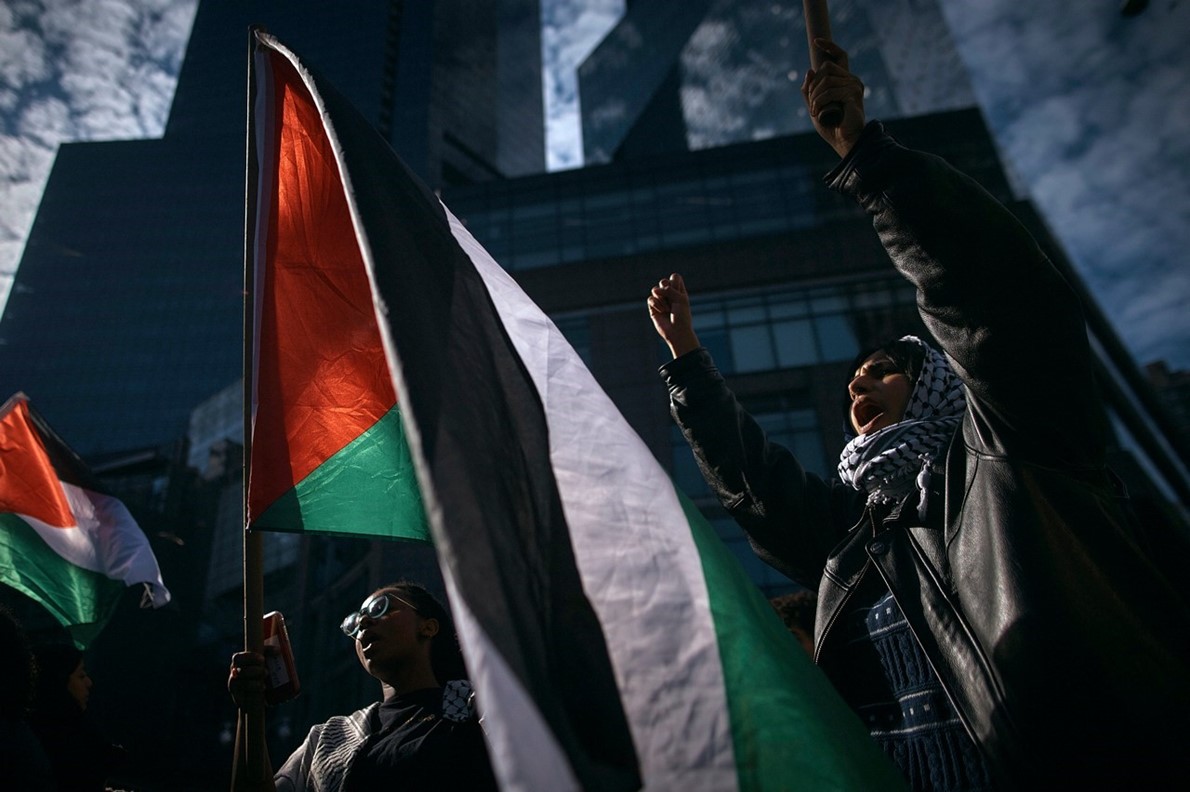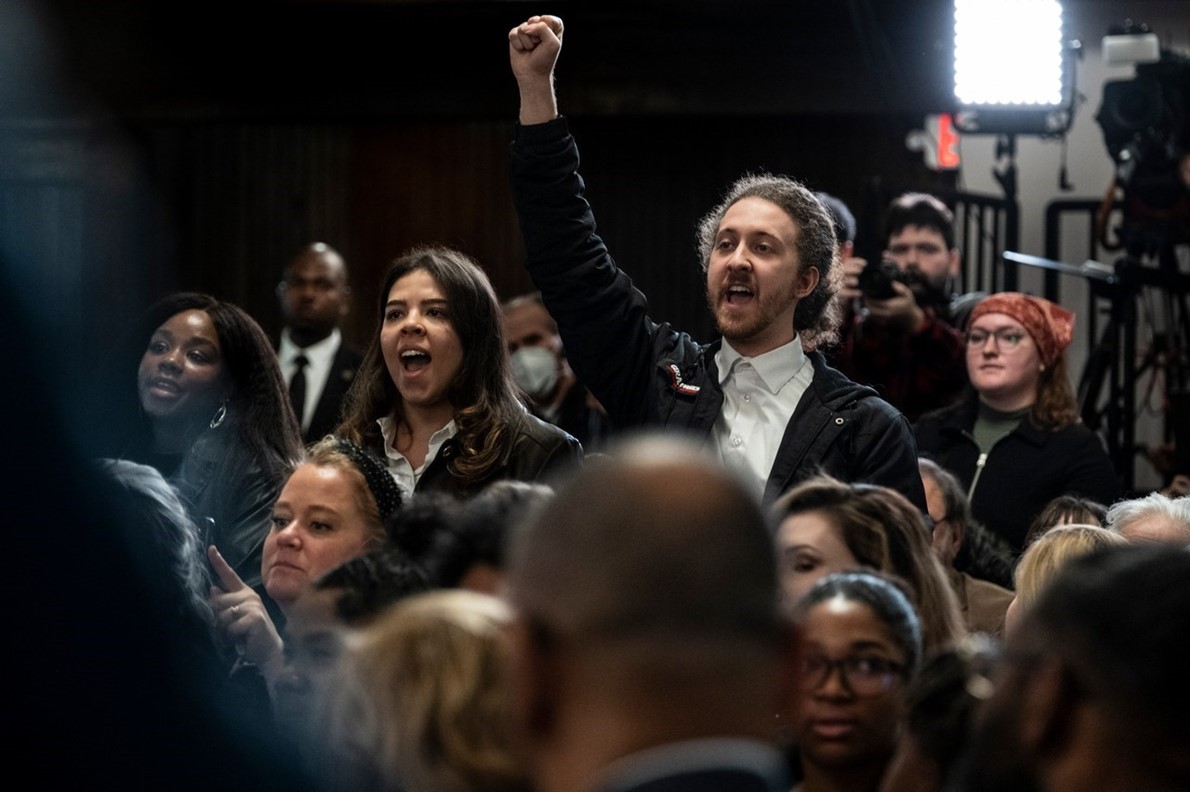One hot Saturday in
August 2014, Sandra Tamari scrolled through social media and learned that a
Black teenager named Michael Brown had been fatally shot by a police officer in
nearby Ferguson, Missouri. Her heart “just sank,” she recalled, when she learned
that Brown’s mother had stood on the other side of the police tape while her
son’s body had been lying in the street for hours.
اضافة اعلان
Tamari, who is
Palestinian-American and lives just outside St. Louis, had spent the previous
weeks mourning the death of Mohammed Abu Khdeir, a 16-year-old Palestinian boy.
He had been kidnapped, bludgeoned, and burned to death in Jerusalem by Israeli
teenagers. The incident was part of a cycle of violence that culminated in the
2014 Gaza War that summer, which killed more than 70 Israelis and more than
2,200 Palestinians.
“I was already in so
much grief about what was happening in Palestine,” she said. She could not
shake the parallels in her mind between Michael and Mohammed. To her, they were
both teenagers stolen from their families by racially motivated violence.
A week later, she and
about 15 members of the St. Louis Palestine Solidarity Committee (STL PSC)
joined the protests that sprang up after Brown’s killing. Before they left, her
husband grabbed some old white cloth and made a banner that read, “Palestine Stands
with Ferguson.”
 A
pro-Palestinian protest in Manhattan on Wednesday, Feb. 7, 2024. The
relationship between the African American quest for civil rights and the
Palestinian cause has become tightly intertwined, but brings political risks,
like straining the alliance between African Americans and Jews.
A
pro-Palestinian protest in Manhattan on Wednesday, Feb. 7, 2024. The
relationship between the African American quest for civil rights and the
Palestinian cause has become tightly intertwined, but brings political risks,
like straining the alliance between African Americans and Jews.
A decade later, the
Palestinian cause in the US has become tightly intertwined with the much more
powerful African American quest for civil rights, an alliance that has been
both strengthened and tested in the four months of war since Hamas killed more
than 1,200 people in Israel.
African-American
writers, leaders, athletes, and celebrities have spoken in support of
Palestinians as Israel’s bombardment of the Gaza Strip pushes the number of
dead past 26,000 people.
Histories
intertwined: The background of the Black-Palestinian alliance
Many Black people who
support Palestinian rights say they see the Palestinian cause in the context of
the African-American experience as the displacement, oppression, and
deprivation of a minority group.
The roots of the
relationship between African-Americans and Palestinians stretch back decades,
to the early days of the modern Civil Rights Movement. Even then, the question
of Palestine was fraught for activists of that era, some of whom saw their
struggle more aligned with that of a Jewish diaspora still recovering from the
horrors of the Holocaust and fighting to build a new and fragile nation.
Yet the views of some
African-Americans have shifted, especially as Palestinian and Black activists
began to collaborate during the Black Lives Matter (BLM) movement, and both
sides began to see their respective causes as linked.
A New York Times
(NYT)/Siena College poll in December showed that African-American voters were
more likely than white or Hispanic voters to sympathize with Palestinians. The
poll showed that 34 percent of Black voters sympathized more with Palestinians
in the conflict, compared with 28 percent of Black voters polled who said they
sympathized more with Israel. As with the other groups polled, younger voters
said they were more sympathetic than older voters to Palestinians.
The poll showed that 17
percent of white voters and 27 percent of Hispanic voters sympathized more with
Palestinians.
For the Palestinian
cause, the alignment with the Black social justice movement in the US is a
chance to move away from the fringes of American politics and boost its profile
by tapping into a much larger, more powerful political network.
For African-Americans,
the tighter bond infuses fresh energy and urgency into social justice causes.
Yet the relationship also presents new challenges and pitfalls, upsetting
historic alliances with some American Jews and raising difficult questions about
the extent of Black support for Israel in the midst of rising anti-Semitism.
And it resurfaces tensions among Black leaders over how the conflict fits into
their own political goals and priorities.
Much of the national
debate over Israel is over terminology itself: what counts as support for the
Palestinian cause and whether that veers into anti-Semitism. Colonialism and
apartheid, part of the lexicon of the Palestinian cause that resonates so powerfully
with African-American activists, are terms rejected by many Jews as offensive
and anti-Semitic.
The relationship
between Black and Jewish people has been strained in the past over accusations
of anti-Semitism against Black leaders like Jesse Jackson and Louis Farrakhan.
On October 14, 2023,
Farrakhan, who has led the Nation of Islam (NOI) for more than 40 years, drew
parallels between Palestinians caught in a humanitarian crisis and Black people
in America in a sermon. Based on this, the Anti-Defamation League (ADL) accused
Farrakhan and the Nation of Islam (NOI) of anti-Semitism.
Now, the NOI is suing
the ADL for defamation for its characterization of the religious group as
anti-Semitic.
The
oppressed looking out for the oppressed
Still, for the
Palestinians, having joined with a broader social justice movement buoyed by a
generation of Black activists, it means the cause stands to become a permanent
feature of mainstream American politics.
“Palestinians, Arabs,
Muslims—we are a small number of folks,” said Ahmad Abuznaid, the executive
director of the US Campaign for Palestinian Rights (USCPR). “It is absolutely
imperative for us to be thinking about building a wider tent for the Palestine
movement here in the US, and we have accomplished that.”
Abuznaid co-founded the
Dream Defenders, a social justice organization of Black, Latino, and Arab
youth, which led a 40-mile march in Florida from Daytona Beach to Sanford, the
city where Trayvon Martin, a Black teenager, was killed by George Zimmerman. In
2015, a year after Ferguson, Abuznaid organized a trip to Israel and the West
Bank for his Black colleagues.
Abuznaid and a small
group of Palestinian and Black activists nurtured the new relationship, leading
campaigns together. One of those Black activists is Montague Simmons, the
director of strategic partnerships for the Movement for Black Lives.
The displacement of
hundreds of thousands of Palestinians from their homes during and after
Israel’s creation in 1948 “resonated in a deep and abiding way,” Simmons said.
African-American
activists became well-versed in the fight for Palestinian rights: the illegal
expansion of Jewish settlements on Palestinian lands, Israel’s practice of jail
detentions without charges, and the blockade and control of Gaza. By the time Israel
began bombarding Gaza in retaliation for the Hamas attack, many young Black
activists in the US were convinced of their common cause with Palestinians.
 Pro-Palestinian
protesters calling for a cease-fire in Gaza interrupt President Joe Biden as he
delivers remarks at the Mother Emanuel African Methodist Episcopal Church in
Charleston, S.C., Jan. 8, 2024. The relationship between the African American
quest for civil rights and the Palestinian cause has become tightly
intertwined, but brings political risks, like straining the alliance between
African Americans and Jews.
Pro-Palestinian
protesters calling for a cease-fire in Gaza interrupt President Joe Biden as he
delivers remarks at the Mother Emanuel African Methodist Episcopal Church in
Charleston, S.C., Jan. 8, 2024. The relationship between the African American
quest for civil rights and the Palestinian cause has become tightly
intertwined, but brings political risks, like straining the alliance between
African Americans and Jews.
But for decades,
leaders of African-American social movements identified their struggle with the
plight of the Jews. They saw their own history as enslaved people, as reflected
in the book of Exodus, in which Moses delivered the Israelites from bondage in
Egypt.
Harriet Tubman, who led
hundreds of slaves to freedom, was known to some only as “Moses.” The evening
before his assassination, Martin Luther King Jr. told his audience that, like
Moses, he might not make it to the Promised Land with his people, but he had
“been to the mountain top” and seen it.
In 1967, when Israel
launched preemptive strikes against Egypt, Jordan, and Syria, more radical
elements of the Black rights movement began to identify with the Palestinians,
according to Michael Fischbach, author of “Black Power and Palestine: Transnational
Countries of Color.”
Before then, Black
leaders saw Israel, many of them Christians, as an underdog in the Holy Land
fighting for survival. But after its victory against neighboring Arab states,
leaders like Stokely Carmichael and H. Rap Brown (now known as Jamil Abdullah
Al-Amin) openly accused Israel of being a beneficiary of America’s
imperialistic aims.
“The question of the
Arab-Israeli conflict divided the Black freedom struggle,” Fischbach said.
Terrance Woodbury,
co-founder of HIT Strategies, a Democratic polling firm that focuses on
underrepresented communities, said that African-Americans today “are rejecting
the false choice that they have to either support the state of Israel or call
for the humanitarian relief of brown babies.”
Black social justice
activists have grappled with where they stand and made up their minds to
support the Palestinian cause, according to Simmons. Now, he said, Black
leaders will need to choose.
Simmons said when he
speaks to African-Americans weighing their response to the conflict, he poses
the same question he did during the unrest in Ferguson: “Are you on the side of
the oppressed or not? There is no real choice.”
Read more Region and World
Jordan News



